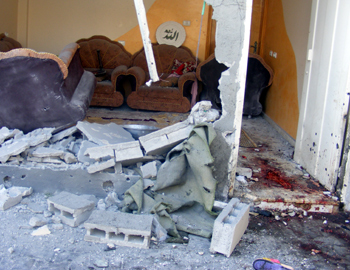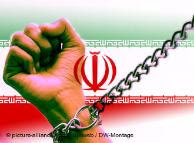B'TSELEM - The Israeli Information Center for Human Rights in the Occupied Territories was established in 1989
Testimony: 9 members of family killed at home when army bombs near UNWRA school, Jabalya refugee camp, Jan. '09
Hussein Dib, 26
I live in the Jabalya refugee camp, 80 meters from UNRWA's al-Fakhura school. I lived on the ground floor with my mother, Shama, my brother, Mu'in, his wife Amal, and their children: Alaa, 20, Muhammad, 15, Mustafa, 13, Asil, 8, and Nur, 4. My brother Samir lived on the first floor with his wife and their children: Muhammad, 23, Fatma, 20, Ziad, 18, ‘Isam, 14, and Fadel, 12.On Tuesday morning [6 January], we woke up and tried to figure out how we could get bread. Samir's sons went looking but the bakeries had none, and they returned about an hour later empty-handed. Mu'in's wife decided to bake bread in a small electric pan we have, and Samir's wife helped her. We all sat with them in the yard in front of the house while they made the bread.
While waiting for the bread to be ready, we heard the sound of bombings and gunfire. Around 4 P.M., there was a huge explosion next to us, and smoke covered the yard. I couldn't see my brothers or their children. My body hurt all over. After a few minutes, the smoke began to clear and I saw a few of my relatives strewn on the ground, covered in blood. Nur was lying next to me, covered in blood. She groaned in pain. I lifted her up and barely managed to get up and walk with her to the main road.

House of the Dib family in Jabalya refugee camp. Photo: Muhammad Sabah, 7 Jan. '09.
When I got to the road, I saw lots of dead and wounded people. People were running around helping the injured. One of them took Nur from me and ran with her to an ambulance. Then I fell to the ground. I had been wounded in the legs and couldn't stand. Somebody picked me up and dragged me to a vehicle that had about ten injured people in it. The vehicle drove us to Kamal ‘Adwan Hospital, in Beit Lahiya. From there, I was taken with my nephews Ziad and Alaa, who were severely injured, to a-Shifaa Hospital in Gaza City.
The next day, I learned that my mother, my brother Samir, and his children Muhammad, Fatma, and ‘Isam, and Muin's children Muhammad, Mustafa, Asil, and Nur, had been killed by shrapnel from the shell that had fallen next to us as we sat waiting for the bread.
The next day, I learned that my mother, my brother Samir, and his children Muhammad, Fatma, and ‘Isam, and Muin's children Muhammad, Mustafa, Asil, and Nur, had been killed by shrapnel from the shell that had fallen next to us as we sat waiting for the bread.
Hussein Shafiq 'Abd al-Hamid Dib, 26, single, resident of Jabalya refugee camp, Gaza Strip. The testimony was given to Muhammad Sabah in Jabalya on Jan. '09.
***********************************************************************************
23 March '11: Stop mortar fire at populated areas in Gaza Strip
On 22 March '11, the Israeli military fired "Keshet" mortar shells at the Shaja'iya neighborhood east of Gaza City. The shells killed four Palestinian civilians, three of them from the same family, including two children. The media reported that the firing was a response to Palestinian firing at southern Israel a short time earlier.
Mortar shells have a wide deviation range. "Keshet" mortars are more precise than other kinds of mortar shells, but their deviation range is still several dozens of meters wide. In the densely populated Gaza Strip, such a range can cause grave harm to civilians. Indeed, the use of "Keshet" mortars has already killed non-combatant civilians in the past. During Operation Cast Lead in the Gaza Strip, several such shells landed in a dense urban area next to the al-Fakhura school in Gaza City, killing 32 civilians who were not taking part in the hostilities, including 11 members of a single family.
A report regarding investigations into Operation Cast Lead, released in July 2010 by Israel's Foreign Ministry, stated that following the al-Fakhura school incident, and as part of Israel's effort to minimize harm to Palestinian civilians, Israel's judge advocate general had recommended formulation of more stringent definitions in military orders to govern the use of mortars in areas populated by civilians. The report also stated that the chief of staff had ordered the undertaking of staff work to draft the required orders.
These statements demonstrate that the highest military echelons are aware of the problematic nature of mortar shells. However, the results of the mortar shelling on 22 March raise fear that in spite of the clear statements in the report, the military has not implemented the recommended changes.
One of the fundamental principles of international humanitarian law is the principle of distinction, which obliges the parties in conflict to distinguish between legitimate military targets and civilian targets. One consequence of this principle is the prohibition on using a weapon that cannot distinguish between targets. Firing mortar shells at a populated area, such as the shells that killed the four Palestinian civilians on 22 March, does not meet this principle and is therefore illegal.
Deliberate targeting of civilians by armed Palestinian groups constitutes a grave breach of the laws of war, and Israeli security forces must act to protect Israeli civilians from such attacks. Launching such attacks from within populated Palestinian areas in Gaza is also illegal and adds insult to injury. However, these violations by Palestinian groups do not justify the violation of the principle of distinction by Israel.
**************************************************************************************************5 April '11: Goldstone then and now
In a recent Washington Post opinion article, Justice Richard Goldstone, head of the UN fact-finding mission into the hostilities in the Gaza Strip (Operation Cast Lead), retracted some of the claims in the original report. He contended that, had he had access to information from the Israeli military, he would have reached different conclusions. He now states that Israel did not intentionally target civilians as a matter of policy, and that there are no grounds for believing Israel committed crimes against humanity. He also praises Israel for taking great effort to investigate complaints, contrary to Hamas’ failure to do so.
B'Tselem stated at the time the Goldstone Report was published that its conclusions were not sufficiently based on the facts presented, precisely on this point of an intentional policy directed at targeting civilians. Goldstone's recent statement is welcome to the extent that it corrects flaws in the original report.
However, this criticism does not negate the report’s main recommendation: that both Israel and Hamas must investigate their conduct during the operation. Goldstone now contends that Israel is doing this, while Hamas is not. But on this point, too, he hastily draws conclusions on a weak factual basis. He states that Israel properly investigated the events, although most of the investigations are still ongoing, nearly two and a half years later. He bases his determination on an interim report on behalf of the UN in which the drafters themselves admit that they are unable to determine the quality of the Israeli investigations and their current status.
The calls now being made by Israeli officials, which interpret Goldstone’s article as a complete retraction of the report’s contentions, completely ignore the fact that that an appreciable number of the investigations that he favorably mentions in his article were opened as a result of the report itself. Were it not for the Goldstone Report and the international process that followed, it is unclear how many investigations, if any, would have been opened and what would have been investigated. For this reason, the calls to shelve the report because Israel has carried out investigations are baseless.
Review of the actual investigative process raises doubts about Goldstone’s statement that Israel deserves praise for its work. Israel has opened 52 criminal investigations into the events of Operation Cast Lead. Three of them have resulted in indictments. It is unclear how many cases have been closed and how many have been finalized. Two and a half years after the operation, we still do not know the results of most of the investigations. Goldstone refers to 400 investigations in his article, but these are operational inquiries carried out by the military and are not an effective investigative tool.
Primarily, though, the criminal investigations focus on specific cases in which individual soldiers ostensibly violated the law. These investigations completely ignore the question of the policy outlined by the senior military echelon and by the political echelon. Who determined which objects were legitimate targets, who established the rules of engagement, who set the number of forces employed? These extremely important fundamental questions have not been examined.
The Goldstone report blamed Israel for the worst of crimes – the possible commission of crimes against humanity. It made this claim without any factual basis and without hearing Israel’s official version (in large part due to Israel’s miserable decision not to cooperate with the fact-finding mission). Since the publication of Goldstone’s retraction, Israeli officials conclude that all its actions were carried out in accordance with law. However, it is imperative to note that in operation Cast Lead Israel killed 758 Palestinian civilians who did not take part in the hostilities, 318 of them minors. In excess of 5,300 Palestinians were injured, more than 350 of them seriously. More than 3,500 houses were destroyed, and electricity, water, and sewage infrastructure was damaged. Gaza has not yet been rehabilitated from the unprecedented destruction it suffered.
The bar pursuant to which Israel’s actions must be judged is not whether the army committed crimes against humanity or war crimes, but rather whether it adhered to all of its obligations under international humanitarian law. The issue of intentionality is only part of the picture. The prohibition on the deliberate targeting of civilians is absolute, but an additional provision of the laws of war is that both sides to a conflict must take all feasible precautions to avoid as much as possible harming civilians.
Dozens of investigations by B'Tselem, other organizations, and the media raise suspicions of illegal conduct during Operation Cast Lead. The only way to investigate these suspicions is by means of an independent Israeli inquiry that deals also with questions of policy. A democratic society must demand more of itself than simply being cleared of the most severe of suspicion






هیچ نظری موجود نیست:
ارسال یک نظر